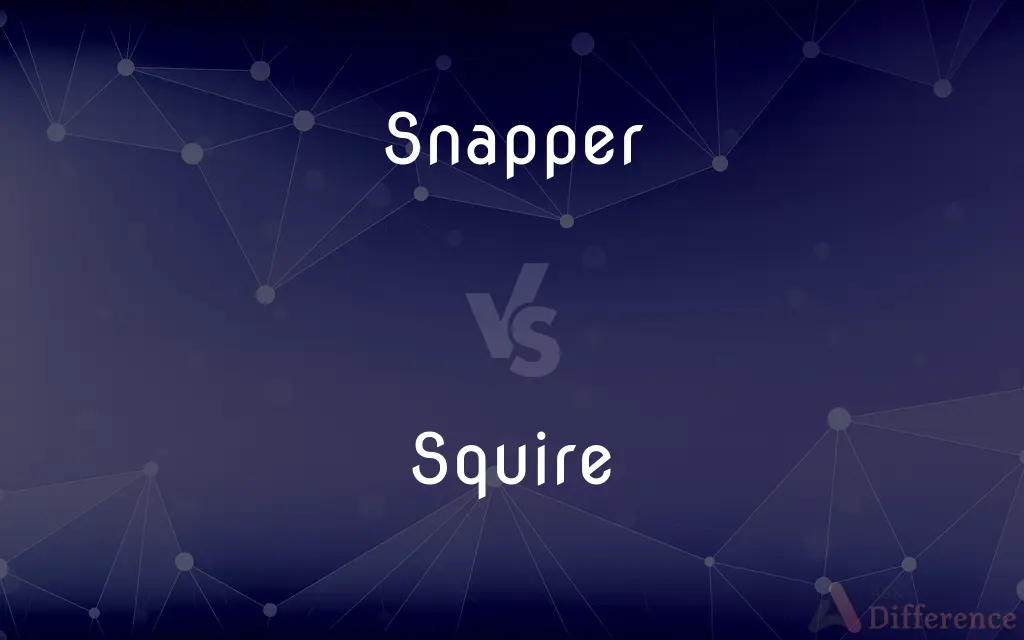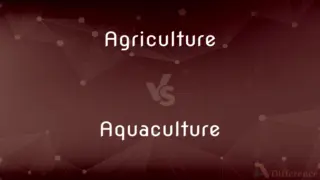Snapper vs. Squire — What's the Difference?
By Tayyaba Rehman & Urooj Arif — Updated on May 6, 2024
Snapper refers primarily to a type of fish found in warmer waters, known for its distinct snapping jaw, whereas Squire traditionally denotes a young nobleman acting as an attendant to a knight.

Difference Between Snapper and Squire
Table of Contents
ADVERTISEMENT
Key Differences
Snapper is a common name for several species of fish within the family Lutjanidae, which are found predominantly in tropical and subtropical oceans. Whereas Squire historically refers to a young noble in feudal Europe who served as an apprentice to a knight, with duties ranging from bearing arms to caring for the knight’s horse.
Snappers are characterized by their sharp, prominent teeth and powerful jaws, making them effective predators and popular targets for sport fishing. On the other hand, Squires were integral to the social and military fabric of medieval society, often seen as a step towards knighthood.
In culinary contexts, Snapper is highly valued for its firm, flavorful flesh, making it a favorite in many cuisines, particularly Caribbean and Southeast Asian dishes. Whereas Squires are more commonly referenced in historical and literary contexts, symbolizing chivalry, training, and service.
Snappers play a significant role in their marine environments, helping maintain the balance of the ecosystem by their predatory activities. Conversely, Squires historically contributed to the governance and defense of their territories, learning administrative and combat skills.
The term 'Snapper' is also used colloquially in various English-speaking regions to refer to things that snap or break easily. While 'Squire' can be used metaphorically in modern English to describe someone in a position of servitude or as a respectful form of address, similar to "sir."
ADVERTISEMENT
Comparison Chart
Definition
A type of fish with a snapping jaw
A young nobleman serving as an attendant to a knight
Habitat/Role
Tropical and subtropical oceans
Medieval European courts
Importance
Culinary delicacy, ecological role
Historical, social training for knighthood
Symbolism
Predatory strength, food source
Chivalry, training, service
Modern Usage
Fish species, metaphor for fragility in some contexts
Metaphor for servitude, respectful address
Compare with Definitions
Snapper
A marine fish known for its sharp teeth and tendency to snap.
The red snapper is popular among seafood enthusiasts.
Squire
A title used in some legal or official contexts.
He was referred to as 'Squire Thompson' in the town meetings.
Snapper
A person who takes photographs, informally called a snapper.
A snapper caught the celebrity couple at the café.
Squire
A young nobleman who assists a knight as part of his training.
The squire helped his master don armor for the tournament.
Snapper
A snapping turtle, also colloquially known as a snapper.
The pond is home to a large snapper that surfaces occasionally.
Squire
In modern usage, a respectful form of address for men.
Good morning, Squire! How can I help you today?
Snapper
Informally, something that snaps or breaks easily.
Be careful with that old ruler; it's a real snapper.
Squire
A young boy serving as a ceremonial attendant.
The squire bore the train of the queen's robe.
Snapper
A type of tool designed for snapping parts together or apart.
Use the snapper to separate these two components.
Squire
A person who attends to someone as a mark of respect or deference.
He acted as a squire to the visiting dignitary.
Snapper
One that snaps.
Squire
Starting in the Middle Ages, a squire was the shield- or armour-bearer of a knight.Use of the term evolved over time. Initially, a squire was a knight's apprentice.
Snapper
A snapping turtle.
Squire
A man of high social standing who owns and lives on an estate in a rural area, especially the chief landowner in such an area
The squire of Radbourne Hall
Squire Trelawny
Snapper
Any of numerous marine fishes of the family Lutjanidae of tropical and subtropical coastal waters worldwide, many of which are important food fishes.
Squire
A young nobleman acting as an attendant to a knight before becoming a knight himself.
Snapper
A porgy (Pagrus auratus) of the Indo-Pacific region, having a pinkish body with spiny fins and valued as a food and game fish.
Squire
(of a man) accompany or escort (a woman)
She was squired around Rome by a reporter
Snapper
One who, or that which, snaps.
A snapper-up of bargains
The snapper of a whip
Squire
A man who attends or escorts a woman; a gallant.
Snapper
Any of approximately 100 different species of fish.
Squire
An English country gentleman, especially the chief landowner in a district.
Snapper
(US) Any of the family Lutjanidae of percoid fishes, especially the red snapper.
Squire
A magistrate or justice of the peace.
Snapper
A (human) baby.
Squire
A local dignitary.
Snapper
(American football) The player who snaps the ball to start the play.
Squire
A young nobleman attendant upon a knight and ranked next below a knight in feudal hierarchy.
Snapper
(US) Small, paper-wrapped item containing a minute quantity of explosive composition coated on small bits of sand, which explodes noisily when thrown onto a hard surface.
Squire
To attend as a squire; escort.
Snapper
(slang) One who takes snaps; a photographer.
Squire
A shield-bearer or armor-bearer who attended a knight.
Snapper
The snapping turtle.
Squire
A title of dignity next in degree below knight, and above gentleman. See esquire.
Snapper
The green woodpecker, or yaffle (Picus viridis).
Squire
A male attendant on a great personage.
Snapper
A snap beetle (family Elateridae).
Squire
A devoted attendant or follower of a lady; a beau.
Snapper
(historical) A telegraphic device with a flexible metal tongue for producing clicks like those of the sounder.
Squire
A title of office and courtesy. See under esquire.
Snapper
(obsolete) A percussive musical instrument consisting of a pair of items to be snapped together; castanet or bones.
Squire
Term of address to a male equal.
Snapper
A string bean.
Squire
(obsolete) A ruler; a carpenter's square; a measure.
Snapper
(slang) The vulva.
Squire
(transitive) To attend as a squire.
Snapper
A punchline.
Squire
(transitive) To attend as a beau, or gallant, for aid and protection.
Snapper
A stumble, a trip.
Squire
A square; a measure; a rule.
Snapper
An error, a blunder, especially a moral slip-up.
Squire
A shield-bearer or armor-bearer who attended a knight.
Snapper
To stumble, to trip.
Squire
A title of dignity next in degree below knight, and above gentleman. See Esquire.
Snapper
(figuratively) To fall into error; to make a mistake, and especially to stumble morally.
Squire
A male attendant on a great personage; also (Colloq.), a devoted attendant or follower of a lady; a beau.
Snapper
One who, or that which, snaps; as, a snapper up of trifles; the snapper of a whip.
Squire
A title of office and courtesy. See under Esquire.
Snapper
Any one of several species of large sparoid food fishes of the genus Lutjanus, abundant on the southern coasts of the United States and on both coasts of tropical America.
Squire
To attend as a squire.
Snapper
A snapping turtle; as, the alligator snapper.
Squire
To attend as a beau, or gallant, for aid and protection; as, to squire a lady.
Snapper
The green woodpecker, or yaffle.
Squire
Young nobleman attendant on a knight
Snapper
A snap beetle.
Squire
An English country landowner
Snapper
A device with a flexible metal tongue for producing clicks like those of the sounder.
Squire
A man who attends or escorts a woman
Snapper
A string bean.
Squire
Attend upon as a squire; serve as a squire
Snapper
(football) the person who plays center on the line of scrimmage and snaps the ball to the quarterback;
The center fumbled the handoff
Snapper
Flesh of any of various important food fishes of warm seas
Snapper
A party favor consisting of a paper roll (usually containing candy or a small favor) that pops when pulled at both ends
Snapper
Australian food fish having a pinkish body with blue spots
Snapper
Any of several large sharp-toothed marine food and sport fishes of the family Lutjanidae of mainly tropical coastal waters
Snapper
Large-headed turtle with powerful hooked jaws found in or near water; prone to bite
Common Curiosities
Where can you catch snapper?
Snapper can be found in warm coastal waters around the world.
How did one become a squire?
Typically, young noblemen were apprenticed to knights, starting as pages before becoming squires.
What types of snapper are there?
There are numerous species, including red snapper and gray snapper, among others.
What age did squires start their training?
Usually in early adolescence, around the age of 14.
Were squires only found in Europe?
Primarily, though similar roles existed in various forms of feudal systems worldwide.
How long does a snapper live?
Some species can live for over 50 years.
Did squires participate in battles?
Yes, often they did as part of their training.
What did a squire do?
A squire assisted a knight with various duties, from maintaining armor to training in combat.
Is snapper good to eat?
Yes, snapper is highly prized for its firm texture and mild flavor.
Can snapper be found in freshwater?
No, snappers are typically marine fish.
Is snapper expensive?
It can be, depending on the species and availability.
What is the biggest threat to snappers?
Overfishing and habitat destruction are significant threats.
Are there female equivalents to squires?
Historically, no, as this was a role reserved for young men, but similar roles existed for women in different capacities.
What armor did a squire maintain?
Everything from helmets and mail to shields and swords.
What happens after someone is a squire?
They might become a knight if they proved their valor and capability.
Share Your Discovery

Previous Comparison
Enneagon vs. Nonagon
Next Comparison
Agriculture vs. AquacultureAuthor Spotlight
Written by
Tayyaba RehmanTayyaba Rehman is a distinguished writer, currently serving as a primary contributor to askdifference.com. As a researcher in semantics and etymology, Tayyaba's passion for the complexity of languages and their distinctions has found a perfect home on the platform. Tayyaba delves into the intricacies of language, distinguishing between commonly confused words and phrases, thereby providing clarity for readers worldwide.
Co-written by
Urooj ArifUrooj is a skilled content writer at Ask Difference, known for her exceptional ability to simplify complex topics into engaging and informative content. With a passion for research and a flair for clear, concise writing, she consistently delivers articles that resonate with our diverse audience.













































